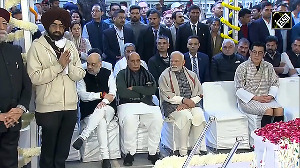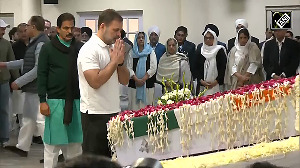Against the backdrop of some US lawmakers suggesting that conditions be attached to Indo-US nuclear deal, India on Thursday made it clear that any change contemplated by the Congress will have to be "within the parameters" of understanding reached between the two sides.
Foreign Secretary Shyam Saran also said that while non-approval of the deal by Congress would lead to "some falling back" in expectations from bilateral ties, other facets of the relations would "not fall by the wayside."
"The understanding that we have reached between India and the US has been the result of a very painstaking and very, very complex negotiations," he said in an interaction session at the Heritage Foundation after delivering a lecture.
"So the understanding is a rather a carefully balanced one and it is a rather delicately balanced one... therefore it stands to reason that whatever change is contemplated should be in line with the parameters of that understanding," he said.
"As long as that legislation is within the bounds of that understanding, I think we will have no problem," he said.
Saran's remarks come close on the heels of the Bush Administration's view that while it welcomed suggestions from the Congress, it would not like to revisit the nuclear deal.
Saran, however, said, "It is really a hypothetical question for the moment because I think we will have to wait and see what precisely is the legislative change that will be brought about after it has been considered by the Congress."
Asked about the kind of shock the broader bilateral relations would receive if the deal were not approved in the Congress, Saran said, "I don't think it is necessary for us to already start predicting its demise. We have the sense that in Washington among the Congressmen there is very, very broad support for India-US partnership."
"If that aspect of India US partnership is taken into view there is no reason why this agreement cannot go through."
"If this does not go through, it does not mean that everything else will fall by the wayside but at the same time we should also recognise that for good reason or bad, there is an intense focus on this particular agreement... Whether we like it or not this has become very symbolic of what we want to do with Indo-US relationship," he said.
"And therefore, if this particular (deal) does not go through there is no doubt there will be, in terms of the expectations that have been created, in terms of the enthusiasm that has been created, there will be some falling back," he said.
Saran dismissed the notion the Indo-US deal had the potential of burying the discriminatory Non-Proliferation Treaty; but argued that their understanding could be some kind of a prelude to a newer international consensus on non-proliferation.
"I don't think we are in the business of being under-takers for any treaty or any agreement...the reason why India did not sign the NPT was because we felt while concrete commitments were being imposed on the non-nuclear weapons states, there was no such commitment of nuclear disarmament on the part of nuclear weapons states and it was rather vague".
"It has always been our position that the goals of non-proliferation could be served better if there was a balance of obligations," Saran said.
"India has always been in the non-proliferation mainstream, although it did not sign the NPT. But India has always been very careful as well not to rubbish the treaty. We have our reservations on the nature of the treaty but we have never rubbished the treaty either," Saran said.
"In so far as the kind of change that is taking place at this point of time...whether this can be the prelude to a broader and a newer international consensus on non-proliferation. We believe that such an international consensus is perhaps overdue," Saran said.






 © 2024 Rediff.com -
© 2024 Rediff.com -